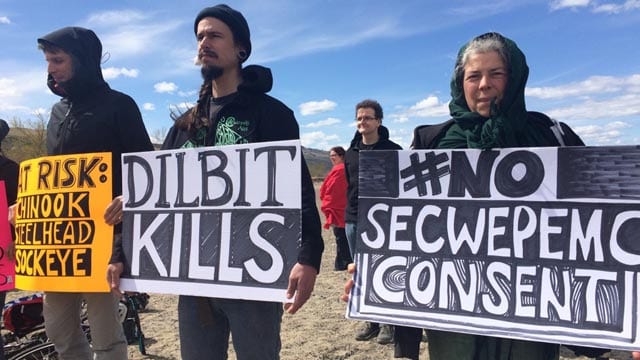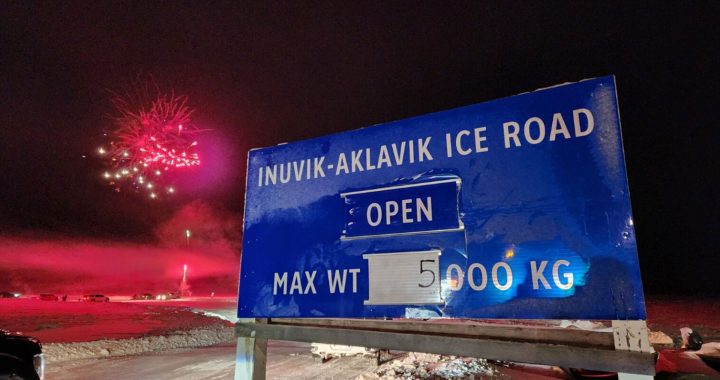
People rally at a "Picnics not Pipelines" event in Kamloops, B.C. April 22, 2018. Lucy Scholey/APTN
(People rally at a “Picnics not Pipelines” event in Kamloops, B.C. April 22, 2018. Lucy Scholey/APTN)
The Federal Court of Appeal’s ruling that consultations for the Trans Mountain project were inadequate has raised concerns from the resources industry about added uncertainty around the duty to consult Indigenous communities, though experts say the precedent adds further clarity to what it means to meaningfully engage.
Thursday’s ruling found the federal government failed in its duty to meaningfully consult with First Nations on major projects as required by established legal principles and Indigenous rights. The court said the National Energy Board’s review of the proposal was so flawed that the federal government could not rely on it as a basis for its decision to approve the expansion.
The court said that, among other issues, the Crown consultation team was missing someone representing government who could engage interactively and could discuss, at least in principle, how to accommodate concerns.
“There was no meaningful two-way dialogue,” Justice Eleanor Dawson wrote on behalf of a panel of judges.
The ruling means the government will have to redo part of its consultation with Indigenous groups.
The court’s ruling doesn’t substantially change legal precedent – which has continued to evolve since court rulings in the early 2000s delivered enhanced recognition of the Crown’s constitutional obligation to consult, and in some cases, accommodate Indigenous communities – but adds clarity to the threshold required to genuinely understand the concerns of the Indigenous applicants, said David Wright, who teaches resource and Indigenous law at the University of Calgary.
“It’s not enough to listen, it’s not enough to just transmit notes back to decision-makers,” he said.
“This decision takes things further along the path to clarity in terms of what’s required to discharge consultation obligations, but some uncertainty remains.”
For industry, the decision is the latest setback in attempts to build major resource projects in the country and adds another layer of uncertainty for investors.
Chris Bloomer, CEO of the Canadian Energy Pipeline Association, said the federal government needs to repair its ailing regulatory system.
“We gotta fix the problem, we can’t keep blaming. We’re at this point where let’s stop trying to find things to blame on people or organizations, let’s fix the problem.”
The ruling shows the regulatory system is too complicated, said Tim McMillan, CEO of the Canadian Association of Petroleum Producers.
“I think it reaffirms that, in Canada, we have a system that’s so complex that even governments struggle with it … Canada needs to reposition itself to be competitive, and having a regulatory system that is understandable, streamlined, simple, I think, isn’t too much to ask.”
Energy analyst Ian Gillies said in a note that the ruling will lead investors to question whether other large projects will move forward.
“We believe the regulatory goat rodeo regarding this project (and others) has led to a significant reduction in investment in Canada and outright divestitures by foreign corporations.”
The decision is a real blow to the Canadian economy as a whole, but won’t likely affect mining projects, said Pierre Gratton, president of the Mining Association of Canada.
“Our industry now has a pretty long history now of how to do its work well, so that Indigenous groups are pretty satisfied. Usually the new project comes with agreements between the company and the affected communities.”
The situation is quite different for pipeline projects that cross vast geographies, said Gratton.
“The most complicated mining project might have a dozen First Nation communities involved, not, you know, well over a hundred as a linear project would have.”
As with the Trans Mountain projects, the mining industry has seen other setbacks because of a lack of clarity from governments on the duty to properly consult Indigenous groups.
The Ontario Superior Court overturned a gold mining permit in July after deciding the Ontario government failed to consult with the Eabametoong First Nation.
Gratton said continued setbacks on the consultation file, including the ruling on Trans Mountain, is a real challenge for the country.
“It’s not an easy task to ensure that duty has been fulfilled, is what this decision seems to be saying. That’s obviously of concern.”
The criteria and level of consultation expected by the court are, however, well established, said Bill Gallagher, a lawyer and resource industry consultant.
“The duty to consult has been defined definitively for at least eight years.”
He said it was clear that the consultations the Trudeau government conducted were inadequate, even though the government did another round of discussions after the Federal Court of Appeal overturned Stephen Harper’s approval of the Northern Gateway pipeline in 2016 over a failure to consult.
“It was totally predictable to me…the feds only sent out note takers, and didn’t take any steps to accommodate the concerns the natives raised,” said Gallagher.
“It’s unbelievable that lightning has struck twice. You have two prime ministers, making the same mistakes.”











Ummm… very confused…
So news like this here and yet you have shows like OilPatch…
Ummm… very confused…
So news like this here and yet you have shows like OilPatch…